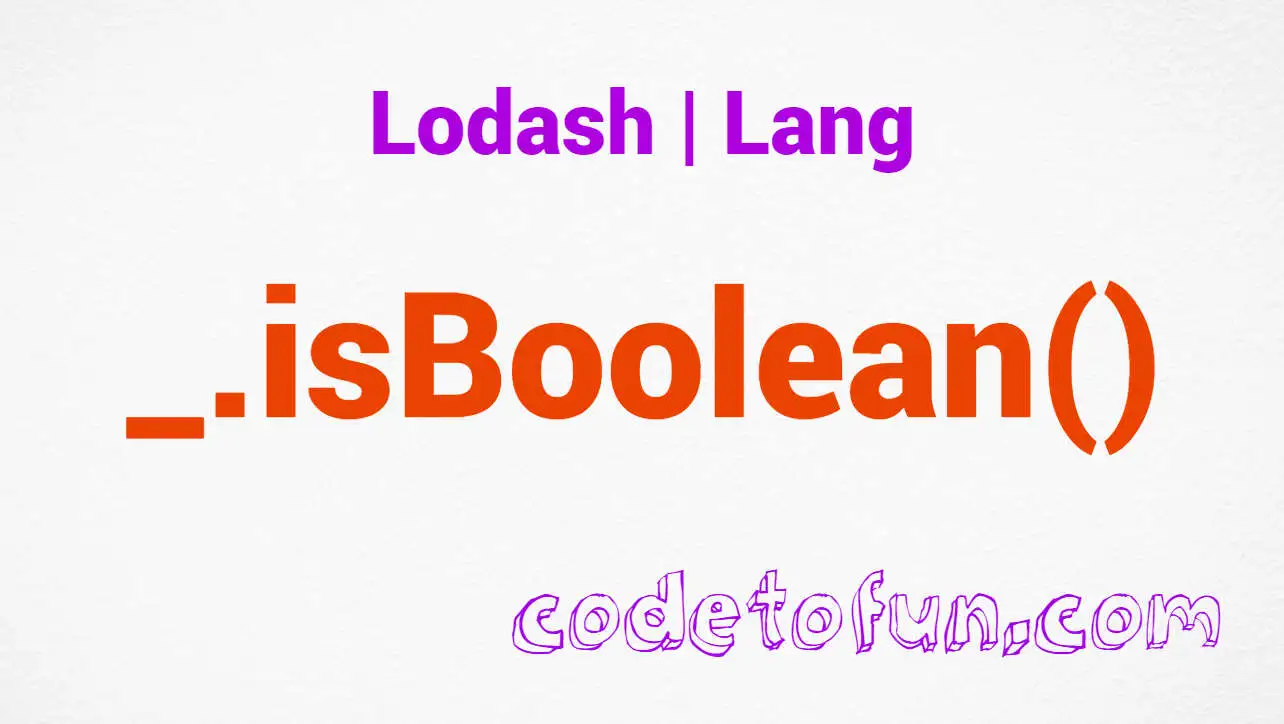
Lodash Home
- Lodash Intro
- Lodash Array
- Lodash Collection
- Lodash Date
- Lodash Function
- Lodash Lang
- _.castArray
- _.clone
- _.cloneDeep
- _.cloneDeepWith
- _.cloneWith
- _.conformsTo
- _.eq
- _.gt
- _.gte
- _.isArguments
- _.isArray
- _.isArrayBuffer
- _.isArrayLike
- _.isArrayLikeObject
- _.isBoolean
- _.isBuffer
- _.isDate
- _.isElement
- _.isEmpty
- _.isEqual
- _.isEqualWith
- _.isError
- _.isFinite
- _.isFunction
- _.isInteger
- _.isLength
- _.isMap
- _.isMatch
- _.isMatchWith
- _.isNaN
- _.isNative
- _.isNil
- _.isNull
- _.isNumber
- _.isObject
- _.isObjectLike
- _.isPlainObject
- _.isRegExp
- _.isSafeInteger
- _.isSet
- _.isString
- _.isSymbol
- _.isTypedArray
- _.isUndefined
- _.isWeakMap
- _.isWeakSet
- _.lt
- _.lte
- _.toArray
- _.toFinite
- _.toInteger
- _.toLength
- _.toNumber
- _.toPlainObject
- _.toSafeInteger
- _.toString
- Lodash Math
- Lodash Number
- Lodash Object
- Lodash Seq
- Lodash String
- Lodash Util
- Lodash Properties
- Lodash Methods
Lodash _.isBoolean() Lang Method

Photo Credit to CodeToFun
🙋 Introduction
When working with data in JavaScript, it's essential to have reliable methods for type checking. Lodash, a comprehensive utility library, provides a variety of functions to simplify common programming tasks. Among these functions is the _.isBoolean() method, designed to determine whether a given value is of the boolean type.
This method proves invaluable for developers striving to ensure data integrity and enhance the robustness of their code.
🧠 Understanding _.isBoolean() Method
The _.isBoolean() method in Lodash is a straightforward yet powerful tool for checking if a value is a boolean. Whether you're dealing with user inputs, function parameters, or data from external sources, this method offers a reliable means of confirming the boolean nature of a given value.
💡 Syntax
The syntax for the _.isBoolean() method is straightforward:
_.isBoolean(value)- value: The value to check.
📝 Example
Let's dive into a simple example to illustrate the usage of the _.isBoolean() method:
const _ = require('lodash');
const booleanValue = true;
const nonBooleanValue = 'false';
console.log(_.isBoolean(booleanValue)); // Output: true
console.log(_.isBoolean(nonBooleanValue)); // Output: falseIn this example, _.isBoolean() confirms that the booleanValue is indeed a boolean, while correctly identifying that nonBooleanValue is not.
🏆 Best Practices
When working with the _.isBoolean() method, consider the following best practices:
Strict Type Checking:
When using
_.isBoolean(), embrace strict type checking to ensure accurate results. Avoid relying solely on truthy or falsy evaluations, as they might lead to unexpected outcomes.example.jsCopiedconst valueToCheck = 0; console.log(_.isBoolean(valueToCheck)); // Output: false console.log(valueToCheck === true); // Output: falseHandle Edge Cases:
Consider potential edge cases, such as undefined or null values, and implement appropriate handling to prevent unintended behavior.
example.jsCopiedconst undefinedValue = undefined; console.log(_.isBoolean(undefinedValue)); // Output: falseIntegration with Conditional Statements:
Integrate
_.isBoolean()seamlessly into conditional statements to control the flow of your program based on the boolean nature of a variable.example.jsCopiedconst userPreference = /* ...retrieve user preference from settings... */; if (_.isBoolean(userPreference)) { // Proceed with logic for boolean user preferences console.log('User preference is a boolean value.'); } else { console.log('Invalid user preference.'); }
📚 Use Cases
User Input Validation:
When dealing with user input, especially in scenarios where boolean choices are involved,
_.isBoolean()proves useful for validating the correctness of user selections.example.jsCopiedconst userInput = /* ...retrieve user input... */; if (_.isBoolean(userInput)) { // Process user input for boolean choices console.log('Valid boolean input received.'); } else { console.log('Invalid input. Please provide a boolean value.'); }Configuration Checks:
In applications where configuration settings influence program behavior, use
_.isBoolean()to verify the correctness of boolean configuration options.example.jsCopiedconst configOption = /* ...retrieve configuration option... */; if (_.isBoolean(configOption)) { // Apply logic based on boolean configuration console.log('Valid boolean configuration detected.'); } else { console.log('Invalid configuration. Please provide a boolean option.'); }Type Guards in Functions:
Employ
_.isBoolean()as a type guard within functions to ensure that parameters conform to expected types, enhancing code reliability.example.jsCopiedfunction performBooleanOperation(value) { if (_.isBoolean(value)) { // Proceed with boolean operation console.log('Performing boolean operation.'); } else { console.log('Invalid input. Expected a boolean value.'); } } const booleanInput = true; const nonBooleanInput = 'false'; performBooleanOperation(booleanInput); performBooleanOperation(nonBooleanInput);
🎉 Conclusion
The _.isBoolean() method in Lodash provides a simple yet effective means of determining whether a value is of the boolean type. By incorporating this method into your code, you can enhance data validation, improve type checking, and ensure the robustness of your JavaScript applications.
By adhering to best practices and exploring diverse use cases, you can harness the full potential of the _.isBoolean() method in your Lodash projects.
👨💻 Join our Community:
Author

For over eight years, I worked as a full-stack web developer. Now, I have chosen my profession as a full-time blogger at codetofun.com.
Buy me a coffee to make codetofun.com free for everyone.
Buy me a CoffeeShare Your Findings to All
Recent Post in lodash


Lodash _.templateSettings.imports Property

Lodash _.templateSettings.evaluate Property

Lodash _.templateSettings Property

Lodash _.templateSettings.escape Property

Lodash _.templateSettings.interpolate Property








If you have any doubts regarding this article (Lodash _.isBoolean() Lang Method), please comment here. I will help you immediately.